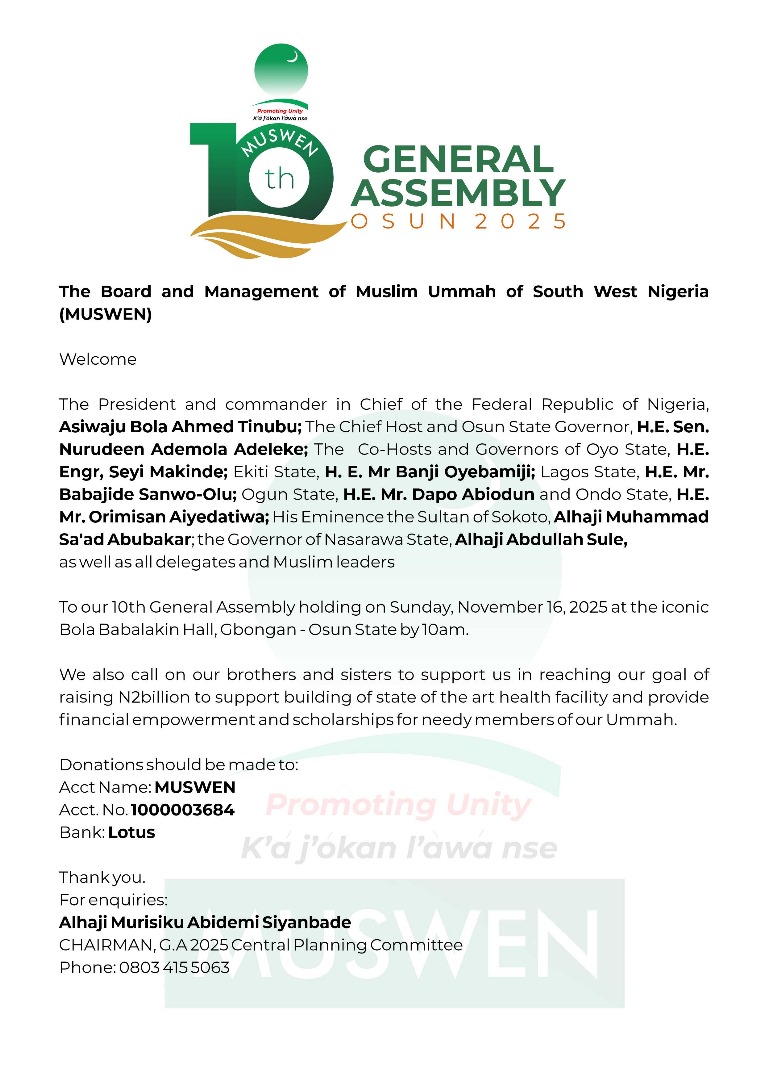By Akeem Alao Babatunde
* First African to bag PhD in Saudi Arabia in 1985
* Sustaining the school after MKO’s demise not easy
Dr. Khidir Mustapha, the principal of Zulikha Abiola Arabic and Islamic Studies Centre, Abeokuta, has made a remarkable impact in the field of Islamic scholarship.
In 1985, he became the first African to earn a PhD in Shari’ah from a Saudi Arabian university.
In this exclusive interview with Muslim News, he discussed the controversy surrounding Shari’ah in Yorubaland, the state of Muslim unity in southwestern Nigeria, and the sustenance of Arabic and Islamic education.

Journey to Becoming the First African PhD Holder in Shari’ah
Dr. Mustapha’s academic journey began in Ilorin, where he completed his primary and secondary education. He later moved to Sagamu and Agege before traveling to Saudi Arabia in 1966 to further his studies.
He bagged his first degree from Islamic University, Al-Madinatu Manawwarat. His Post Graduate in MLB in Shariah and Phd respectively from Ummul Qurah, University Makkah Makarramah, in 1985
Despite his groundbreaking achievement as the first African to attain a doctorate in Shari’ah, Dr. Mustapha remained humble, stating that he was never one to publicize his accomplishments. “I hide myself a lot,” he admitted.

Education in Saudi Arabia: Then
Reflecting on his time as a student in Saudi Arabia, Dr. Mustapha noted that education was entirely free, and students even received monthly stipends. “In those days, students were well taken care of. We did not have to pay fees, and the government provided financial support,” he said.
Relevance of Shari’ah in the Lives of Muslims
Dr. Mustapha emphasised that Shari’ah remains fundamental to Islamic teachings. “It is very useful in all our activities. Whatever we do must align with what the Shari’ah says,” he stated.

When asked about the controversy surrounding the establishment of Shari’ah in Yorubaland, he dismissed it as unnecessary. “Islam is a global religion. The controversy about Shari’ah is meaningless,” he remarked.
Challenges of Muslim Unity in the Southwest
Dr. Mustapha identified disunity among Muslims as a significant problem in southwestern Nigeria. “Unity comes from the mind. If we fail to unite in our hearts, there will be no unity,” he warned.

He stressed the importance of togetherness among Muslims for their collective progress.
Sustaining the Zulikha Abiola Arabic and Islamic Studies Centre
Dr. Mustapha was seconded from Religious Attache, Saudi Embassy in Nigeria to the Zulikha Abiola Arabic and Islamic Studies Centre as Principal since February 1988.
Four other eminent scholars were also seconded on and before his arrival. They are Sheikh Muhammad Hassan Hamd, Sheikh Irshad Iqbal Ahmad, Sheikh Nurudeen AbuBakr Adeyeri and Sheikh Wakeel AbdulAzeez Ahmad Salafi.
As the head of the institution built by the late Moshood Kashimawo Abiola in memory of his mother – Zulikha Abiola in 1983 to promote teaching and research of Arabic and Islamic Studies in Nigeria and beyond, Dr. Mustapha shared insights into how the school continues to thrive despite challenges.

“We have started collecting fees from students to pay our staff. Alhaji AbdulLateef Kola Abiola had been playing meaningful roles, both financial and moral supports, despite his family responsibilities,” he explained.
Admission into the school requires candidates to obtain a form and fulfill other necessary requirements.
More than 2,500 students have been turnout from the inception.
Impact of the Institution on the Muslim Community
The Zulikha Abiola Arabic and Islamic Studies Centre has played a vital role in providing quality education to Muslim children. Dr. Mustapha highlighted the school’s contributions to the community, stating that it fosters both academic and religious growth.

Remembering MKO Abiola’s Contributions
Dr. Mustapha also paid tribute to the late Chief MKO Abiola, a significant benefactor of the institution.
“We missed a lot of things after his passing. He used to finance everything about the school. Even when he was paid his salaries, he ensured the school was taken care of,” he recalled.








